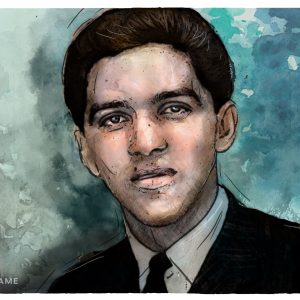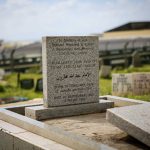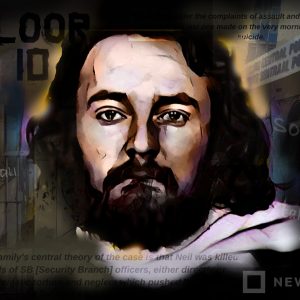Long Read | The unfinished business of the TRC
The ANC said it would hold those guilty of crimes against humanity to account – but is mum on those involved in political interference in Truth and Reconciliation Commission prosecutions.
Author:
16 November 2020

The ANC has broken its 17-year official silence on Truth and Reconciliation Commission (TRC) prosecutions and committed to getting justice for victims’ families. There also have been calls for the government to address the often-ignored issue of reparations for victims of apartheid.
On 6 November 2020, the Supreme Court of Appeal heard the application of former apartheid security police clerk João Rodrigues to have the case of murder against him dismissed. Rodrigues is implicated in the death of activist and teacher Ahmed Timol in 1971.
In 2017, Judge Billy Mothle, who presided over the reopened inquest into Timol’s death, recommended the National Prosecuting Authority (NPA) prosecute Rodrigues. The decision was appealed and dismissed in 2019. This month, his lawyers argued that the 47 years between the death of Timol and the prosecution of their client in 2018 have prejudiced Rodrigues’ constitutional right to a fair trial. They also argued that the political interference into the prosecution of TRC cases has prejudiced the octogenarian.
Related article:
His counsel suggested Rodrigues may have been granted amnesty without his knowledge through a “backdoor amnesty” process by the Thabo Mbeki administration in 2005. The courts struck down this process in 2008 because it favoured perpetrators over victims. Rodrigues had the opportunity to raise this suspicion at the reopened inquest in 2017 but did not.
The NPA and the high court in Johannesburg that dismissed Rodrigues’ appeal in 2019 acknowledged political interference in the amnesty process.
The Supreme Court of Appeal indicated that although it would have to consider the issue of political interference in light of Rodrigues’ arguments, it is unlikely the court will make a general ruling on the matter.
Judgment has been reserved, but whichever way the decision goes, the matter will almost certainly be taken to the Constitutional Court, meaning a further delay in Rodrigues’ prosecution. It could, however, set the stage for an important final pronouncement on political interference, which will serve as a precedent for the many TRC cases still to be pursued.

Two-decade delay
Delays still dog the TRC’s prosecuting process, worsened by hearings having to go online in recent months. The reopened inquests into the deaths of activists Neil Aggett and Hoosen Haffejee have both been interrupted by the pandemic.
After almost five years of bureaucratic delays, the prosecution of former security branch members responsible for the death of activist Nokuthula Simelane was set to begin in October. It has yet again been postponed.
Similarly, the families of the Cradock Four are still waiting for the NPA to make a decision on whether it will prosecute members of the security police involved in the 1985 murders of Matthew Goniwe, Fort Calata, Sparrow Mkonto and Sicelo Mhlauli.
Related article:
Lukhanyo Calata, Fort’s son, asked that the issue of political interference into TRC cases form part of Judge Raymond Zondo’s inquiries at the Zondo Commission of Inquiry into State Capture. The appeal is yet to be answered.
Likewise, President Cyril Ramaphosa has not responded to two letters written by victims’ families, non-profit organisations and former TRC commissioners asking for action on the prosecution of TRC cases and an investigation into those implicated in political interference.
The ANC responds
But there has been some movement from the ANC, which may have a significant effect on the speed and efficiency of TRC prosecutions.
On 27 October, the 49th anniversary of Timol’s death from his fall from the 10th floor of the John Vorster Square police station and on what would have been the 103rd birthday of ANC leader Oliver Tambo, the ANC released a statement.
It is its first public pronouncement in almost two decades on the fate of TRC cases: “The ANC rejects with contempt the machinations by Rodrigues and others to try and escape accountability for their heinous deeds, trying to gain blanket amnesty for their crimes against humanity.

“We remain resolute that justice for Timol and others must be done. It is for this reason that the ANC joined hands with the Foundation for Human Rights and families of apartheid-era victims like the Timol, Stanza Bopape, Nokuthula Simelane and the Cradock Four families – who are still yearning for justice and closure.”
The party has now formed a joint committee chaired by ANC deputy secretary Jessie Duarte “to investigate and develop a plan of action – working with the Minister of Justice – to ensure justice for the families of the victims of apartheid-era crimes, including crimes against humanity, which are still unresolved”.
Right now the government is legally obliged to pay the legal costs of former members of the apartheid regime, while victims’ families have to rely on the assistance of organisations such as the Foundation for Human Rights (FHR) and the pro bono departments of legal firms to fund their prosecutions.
Related article:
To make this fairer, the ANC has also committed to petitioning the National Democratic Lawyers Association, Advocates for Transformation, the Pan African Bar Association and the Black Lawyers Association “to make their members available to help with investigations and prosecutions of these 350 cases expeditiously in order to give families justice and closure”.
As Timol’s nephew Imtiaz Cajee points out, in the Rodrigues matter “the state has spent more than R3.5 million … Somebody like me [who is] going to the [Supreme Court of Appeal] totally depends on the FHR and Webber Wentzel who do pro bono work to represent me.”
Calata believes Rodrigues “is trying to delay his day in court for as long as he possibly can … because he’s not paying for it. He’s using every legal avenue that’s available to him.”
Why justice now?
For observers of the Sisyphean struggle for justice by apartheid-era victims’ families, the statement from the ANC is unexpected. After so many appeals by families and so many unheeded calls for something to be done, why has the ruling party decided now is the time for it to break its silence? Have the constant demands for action finally worked? Or is this part of Ramaphosa’s plan to root out the corruption that became endemic under Jacob Zuma?
FHR director Yasmin Sooka says the ANC statement is the result of a series of meetings that began after an event in Cape Town last year to commemorate the 50th anniversary of the death in detention of activist Imam Abdullah Haron.
Related article:
The speakers included Sooka, Calata, Cajee and Nkosinathi Biko. Sooka was approached by Duarte, who asked why the FHR and victims’ families had not come to the ANC directly for assistance. A series of meetings then began with Duarte and other ANC members, including Krish Naidoo and Febe Potgieter-Gqubule, to develop a plan of action.
At one of these meetings, Sooka recalls saying: “In your capacity as the ANC with members who have died for your cause, you’ve said nothing … You’re going to be dreadfully exposed if the Zondo Commission deals with this issue and also when the [Supreme Court of Appeal] begins to unpack Rodrigues’ argument, so you guys need to get your act together.”
Sooka points out that the committee mentioned in the ANC statement will include representatives of the FHR and others as yet unnamed stakeholders and that the party should not be seen to be directing or influencing the prosecution of TRC cases.

“The ANC is quite clear that they want to be quite careful that they’re not seen to interfere with the independence of the NPA or the Hawks, but they’re also clear that they have the advocacy and the lobbying power to raise these issues with different ministries. From that perspective, even the committee’s review of these cases cannot substitute for a proper investigation by the NPA.”
Calata believes the announcement is a result of families having “made enough of a noise as a collective to eventually make it on to their radar”. He realises that “the ANC is a political party and they are … going to use this opportunity to try and paint themselves in glory”. But he thinks the statement “is an admission from their side that they could no longer … turn a blind eye to our suffering, to our pain. We’re … pleased … the ANC is now [going to] help us to make strides towards getting justice for people [who] actually died advancing the interests of the ANC in the first place.” He is also careful to add that this “doesn’t make up for anything. They have to make up for the last 20 years of their governance.”
Politicians should be held to account
There is no mention in the statement of the allegations of political interference and its role in delaying justice. This is perhaps unsurprising, given that many of those implicated are former high-level members of the ANC.
But the attempt to stall these cases for so long has created a separate problem in the TRC prosecution saga. Families are not going to ignore or gloss over the issue, regardless of the ruling party’s commitment to overcome prosecutorial problems.
As Cajee sees it, “the issue of political interference must be gotten to the bottom of and those responsible must be called to answer. It’s significant because in the 14 years between 2003 and 2017 [the year the Timol inquest was reopened], how many perpetrators have passed on? How many witnesses? How many family members?”

Calata echoes this, arguing that even if “the ANC sticks to its word and fulfils the intent set out in that statement, that’s a completely separate matter from the fact that we know that there was political interference in these issues and that the people who were behind that political interference still need to be held accountable.
“We need to get to the bottom of this, and if someone as high up as the former president of the ANC needs to be held to account … then he must answer.”
Sooka says that the ANC’s announcement is a step in the right direction but that it should “be positive in the sense that it leads to justice for the victims”.
She hopes the committee will finalise a draft agreement by January and make appointments for investigative capacity in the NPA by March so that actual progress on TRC cases can begin.
Related article:
Cajee hopes the planned committee will lead to “some kind of national call to say in the next five years we want to bring an end to the decades of having no answers. Whatever those cases are, my view is that we have to have a sort of national coalition on the table where more people come forward to help address the lack of capacity in the NPA. It’s about political will. We need legal experts, investigative journalists and even psychologists specialising in [post-traumatic stress disorder] to all work together to help this process.”
The ANC did not respond to requests for comment, and the Zondo Commission has yet to publicly announce whether it will allow testimony into allegations of political interference in TRC cases.
For the moment, the ruling party’s announcement must at best be seen as an acknowledgment that it has heard families’ increasingly frustrated calls for something to be done. Whether or not this translates into significant action remains to be seen.

Victims demand reparations
Meanwhile, on 28 October, the day after the ANC released its statement, another burning TRC-related issue came into the spotlight.
One hundred and twelve members of the Khulumani Support Group staged a sleep-in on the lawns of the Union Buildings in Pretoria to demand “reparations now!” for survivors of human rights violations during apartheid. As Khulumani board member Judy Seidman wrote in a recent op-ed for The Daily Maverick, more than two decades since Nelson Mandela pledged to compensate victims, “government has paid out little or nothing in reparation. Those who were promised redress remain in desperate need; many are dying in poverty and despair. Many still live with physical damage from torture and bullets; without promised houses, medical care, education for their children or financial assistance. Their distress indeed has worsened, driven by continued inequality, corruption and now Covid-19.”
The issue of reparations has been a hotly contested and complicated affair. The final TRC report officially recognised 22 000 victims of apartheid-era human rights violations, and recommended that they be given reparations of R126 000 over a six-year period. Mbeki reduced this to a one-off payment of R30 000 each. Fewer than 16 000 people on the TRC’s list received the reduced amount.
Reparations have been further complicated by the fine print governing the mandate of the TRC process, which only recognised victims whose statements were recorded by the commission before the end of 1997. Those who did not get to the TRC in time or whose statements were not recorded or whose records were lost were not included in the commission’s final “closed list” of victims.
Related article:
Importantly, as Seidman observes, “[that list] excluded thousands of women who were raped by apartheid forces – as the TRC did not include rape as a political crime that could qualify for amnesty”. In the 17 years since the TRC’s final report, Khulumani’s efforts to get the Department of Justice and Constitutional Development to add to the commission’s list have been met with indifference. The department continues to assert that the regulations governing the drawing up of the closed list cannot be changed. But, as Seidman notes, “the TRC Act itself prescribes mechanisms to add to the list, and also provides for adjusting and changing regulations developed under the act by the Presidency and the Minister of Justice”.
Khulumani has a database of close to 100 000 people the organisation believes meet the requirements to be deemed victims of apartheid human rights violations and who therefore qualify for reparations.

For those victims, the fact that the government is paying millions of rands in legal fees for former apartheid perpetrators is a bitter pill to swallow. Other reparations proposed by the TRC and accepted by Parliament, such as health benefits, education and housing, have also not been forthcoming. The R1.68 billion set aside in the President’s Fund for victim reparations is part of government’s investment in the Public Investment Corporation.
The justice department has maintained that government has already paid out all monies owed for individual reparations and that the remaining funds are to be allocated to “community rehabilitation projects”. The draft regulations for the allocation of these funds have raised red flags with Khulumani and other organisations. Seidman is concerned they will allow “[justice department] officials to handpick communities to receive these funds [and] to work with municipal officials to design projects, with minimal consultation with beneficiaries.”
“At best, government officials will use reparations money to bail out bankrupt municipalities; at worst, they will open the door to corruption,” Seidman says.
After their sleep-in, Khulumani protesters were told by the Presidency that they need to meet with Minister of Justice and Constitutional Development Ronald Lamola to discuss reparations. They were assured that the Presidency would direct Lamola to meet with them within seven days. That time is now up. Like so many problems arising from the failure to address the unfinished business of the TRC, the ball is now in government’s court.







